Happy New Year! We hope that your holiday period has been a joyful one. We have selected some exciting teas to share with you in the New Year for your Curious Tea subscriptions! To start off 2017 on a high note, this January we have an excellent selection of teas for you to try. We have selected the following four teas this month: a real Chinese oolong classic, Tie Guan Yin, known in English as Iron Goddess of Mercy; an unusual black Shui Xian tea from Zhang Ping in China that comes pressed into square cakes; a wonderfully complex Vietnamese green tea, the Lung Phin Tiger Monkey; and finally a purple leaf varietal black tea from Yunnan, Dian Hong Jing Mai Purple Needle.
- Light: Tie Guan Yin Iron Goddess of Mercy and Lung Phin Tiger Monkey;
- Dark: Black Zhang Ping Shui Xian and Dian Hong Jing Mai Purple Needle;
- Mixed: Tie Guan Yin Iron Goddess of Mercy and Black Zhang Ping Shui Xian.
Our Discovery tea taster subscription boxes contain 10g taster pouches of all of the above teas. Don’t forget that all subscribers also benefit from a 10% discount on all teas from our tea shop!
To help you along with the tasting, here is some further information on all teas featured in our January boxes.
Tie Guan Yin Iron Goddess of Mercy
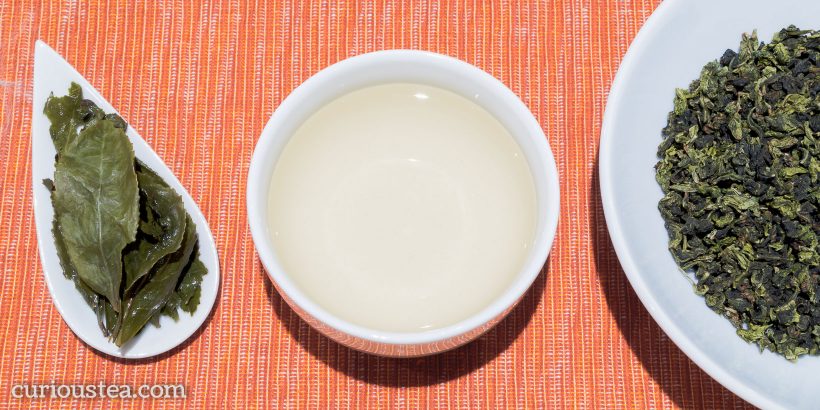
Tie Guan Yin (鐵觀音) is our premium version of a true Chinese classic oolong. This one comes from Anxi County in Fujian Province, the birthplace of this very famous and popular tea. This Tie Guan Yin is Anxi style, which means that it is lightly oxidised, retaining many of the delicate floral aspects that are a closer to a light green tea without the grassiness or astringency. This type of oolong has become known as a ‘jade’ or ‘green’ oolong due to the light appearance and colour that is reflected both in the leaves of this tea as well as the light coloured liquor.
The tea is named after the Chinese Goddess of Mercy Guan Yin, also known in Japan as Kannon and in Korea as Gwan-eum. Other spellings and names for this tea include TGY, Ti Kuan Yin, Tit Kwun Yum, Ti Kwan Yin, Iron Buddha, Iron Goddess Oolong and Tea of the Iron Bodhisattva. So the English ‘Iron Goddess of Mercy’ is a literal translation of ‘Tie Guan Yin’ and is the most appropriate English name for this Chinese oolong.
There are two legends that explain the origin of the name of Tie Guan Yin Iron Goddess of Mercy oolong. One tells a story of a scholar called Wang who discovered a tea plant under Guan Yin rock, brought it home and then cultivated this tea. When he brought this tea to the Emperor as a gift, the Emperor liked the tea so much he wondered where this tea originated. As it was found under the Guan Yin rock, it was decided to call it Guan Yin tea.
Another legend tells a story of a poor farmer called Wei. There was a temple with an iron statue of Guan Yin on the way from the tea fields that Wei walked past every day and he noticed that the condition of the temple was worsening. He decided to do something about it so he took it upon himself to clean the temple and light incense in it twice a week; he proceeded to do that over many months. One night Guan Yin appeared to him in his dream telling him that there was a cave behind the temple with treasure that awaited him. Upon entering the cave Wei discovered a tea plant shoot. He planted it in his field and nurtured it into a large tea bush. This tea plant produced the finest tea, so he shared the cuttings from this bush with all his neighbours. Wei and his neighbours started making and selling this fine tea under the name Tie Guan Yin. As they prospered from it, they were able to fully repair the beautiful temple.
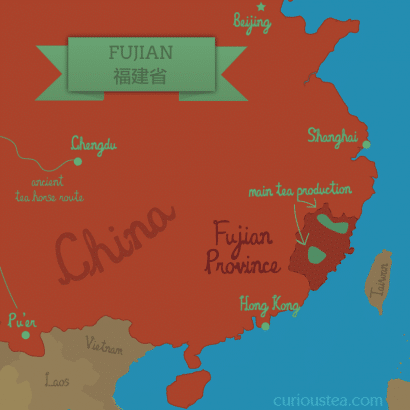
This particular crop of our Tie Guan Yin Iron Goddess of Mercy oolong was plucked in spring, May 2016, in Anxi County of Fujian Province in China. This oolong undergoes a very complex production process that results in quite a unique tea. The processing goes through the following stages: plucking of tea leaves, sun withering, cooling, tossing, withering with slight oxidation, further tossing and withering, fixation, rolling, drying, sorting and finally packing. As the tea nears the completion of this process, the distinctive colouration of the leaves becomes apparent. You can easily see this on the dried leaves, they become quite light in colour on the edges, almost frosted in places. This is a distinguishable feature of a well-made and correctly processed Tie Guan Yin Iron Goddess of Mercy oolong.
The tightly rolled light green, jade coloured leaves of this Tie Guan Yin Iron Goddess of Mercy oolong have a slight green floral aroma. When brewed, the leaves unfurl, producing a pale gold coloured liquor with a floral scent. The taste is light, with no aftertaste, grassiness or astringency. It is floral, lightly vegetal, buttery and a little sweet. This is a very refreshing and light cup of tea that has qualities that are similar to a light sweet green tea yet with a more balanced and smooth flavour that has no grassiness or astringency you often find in green teas.
This oolong is best brewed at 90°C for 3-4 minutes according to your taste and can be brewed more than 4 times, increasing steeping time with each next brew if desired.
You can buy Tie Guan Yin Iron Goddess of Mercy oolong tea in our online shop.
Lung Phin Tiger Monkey
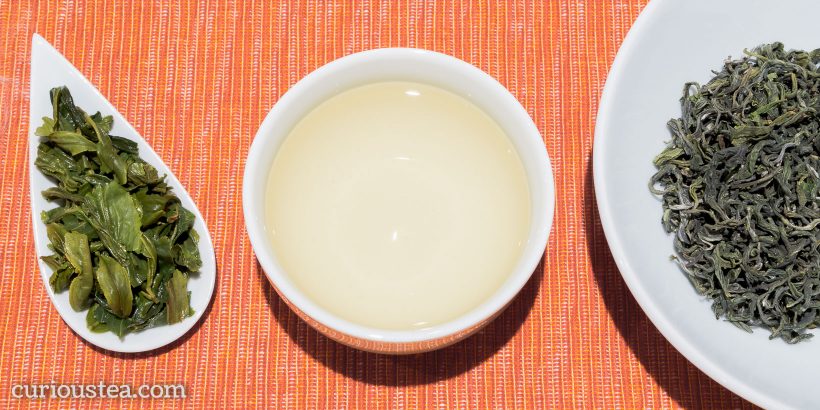
Lung Phin Tiger Monkey is a wild grown green tea from Lung Phin village in Ha Giang Province of Vietnam. It is produced entirely by Mr Po and his family, who belong to the ethnic Black H’Mong people, just outside of Lung Phin village. The leaves are plucked from tea trees that grow wild around their homes. This tea undergoes a simple traditional processing technique and is unusual in that it is hand dried in a wood fired pan rather than baked. The altitude of the village and the wild trees that grow there is around 1,500m. The local soil character as well as weather conditions allow only three short spurts of growth on the trees a year, each being a distinctive flush. This particular tea was plucked in summer 2016.
The name for this tea comes from the village of origin, Lung Phin, and the days of the Vietnamese lunar calendar, Tiger and Monkey. It is on these days that there is a colourful village market in Lung Phin, where this tea can be bought locally. We think that Tiger Monkey also happens to be quite a fitting name for a green tea with such a strong character.

This Lung Phin Tiger Monkey green tea is made from Camellia sinensis var. Assamica, the tea bush predominantly used to make Indian teas. This results in a green tea with strong character that is akin to some other Indian green teas. Nevertheless this Vietnamese green tea exhibits a more balanced and complex character that is quite special.
The large dry twisted leaves of this Vietnamese green tea have a green and silvery appearance. They produce an opaque light yellow coloured liquor with a zesty and smoky scent. The character of this Lung Phin Tiger Monkey green tea is a unique combination of sweet and savoury flavours. There is definite, although minimal, astringency present on the aftertaste but this is quite nicely balanced by the sweet umami notes of green peppers and citrus that hit your palate prior to the aftertaste. A delightful tea that really stands out due to the combination of sweet and savoury flavours as well as the pleasant smoky aroma. It is a full bodied and complex tea that really is rather different when compared to lighter Chinese or grassier Japanese green teas.
We suggest brewing at 80°C for 1-2 minutes according to your taste. Lung Phin Tiger Monkey green tea can be brewed 4 or more times depending on your taste preferences. Repeated steepings really help develop the complex flavours of this tea as well as bring out the interplay between the mild astringency and the sweet and savoury flavours.
You can buy Lung Phin Tiger Monkey green tea in our online shop.
Black Zhang Ping Shui Xian
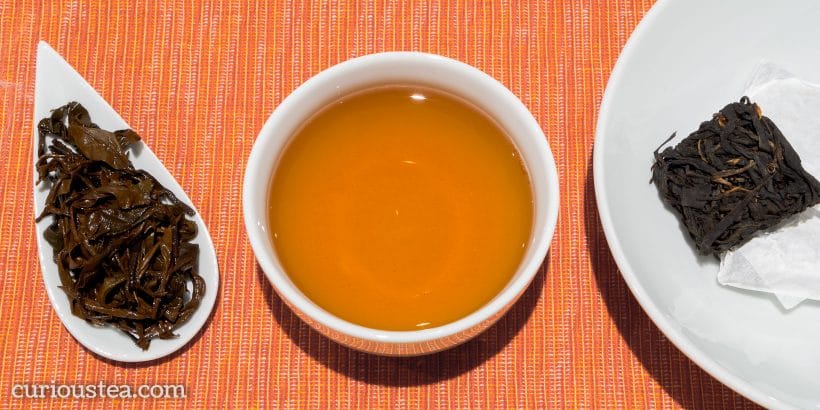
Black Zhang Ping Shui Xian (漳平水仙) is an unusual and rare black tea that comes pressed into square-shaped cakes. This is a second Zhang Ping Shui Xian to feature in Curious Tea subscription boxes. In November 2016 we had a roasted oolong version of this tea. This time we have included a black version of the same tea. Unlike the oolong, this tea is allowed to fully oxidise to produce a tea that is full bodied and complex and is very much in the black tea category.
Zhang Ping is a city in the southern part of Fujian Province and it is around this city that this tea is grown. Shui Xian (sometimes Shui Hsien) is typically a type of oolong tea that comes from Fujian Province. Shui Xian translates as ‘narcissus’ or ‘water sprite’ in English and is famous for the honey aroma and flavour. While Shui Xian is definitely more famous for being an oolong, the tea master in this case has created a unique black tea using the leaves and techniques normally reserved for producing a completely different sort of tea. However when compared to the oolong version of this Shui Xian, you can clearly see some similarities as both teas have similar sort of floral notes.

This Black Zhang Ping Shui Xian was plucked in late summer 2016, after which it has undergone careful hand processing. The large leaves are pressed into square cakes, each cake being 6-8 grams in weight. This tea is fully oxidised, producing a a smooth and mild tea with a pleasant profile of cocoa and malt.
To make this tea, unwrap the cake from the paper, and break off an amount of tea required. If using the whole cake, it can be agitated once it is in water, so the leaves start coming apart in order to brew properly. The dark leaves produce a liquor with a satisfying aroma of cocoa and malt. This Black Zhang Ping Shui Xian has a smooth complex flavour that is smooth and balanced in character with some floral hints. The wonderful sweet buttery notes of cocoa and malted rye complete the profile.
We suggest brewing parameters of 90°C for 3-4 minutes according to your taste, brewing 3 or more times. You can increase the temperature to 95°C and up the brewing time for subsequent steepings. The weight on our tea packets for this tea is only indicative due to varying weight of the cakes, which average around 7 grams: our 10g sample packs of this tea contain two cakes for you to try while the full sized 50g pouches have around 7-8 cakes.
You can buy Zhang Ping Shui Xian Black tea in our online shop.
Dian Hong Jing Mai Purple Needle
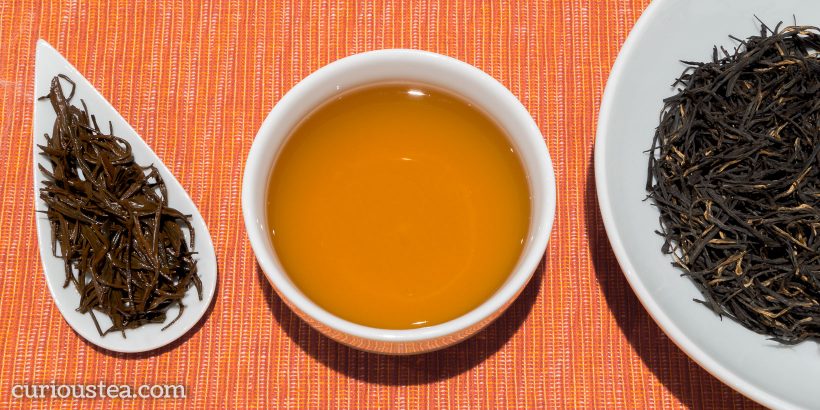
Dian Hong Jing Mai Purple Needle (滇红景迈紫針) is another characteristic Yunnan Red tea. Featuring a lovely character that is balanced and sweet, it has smooth fruity and malty notes, with a taste reminiscent of sugared plums!
Dian Hong, literally Yunnan Red, refers to the origin and type of tea (red according to Chinese tea classification). Jing Mai refers to the location of this tea’s origin. Jing Mai mountain area (Jing Mai Shan) is located in Lancang Lahu Autonomous County under the jurisdiction of Pu’er City of Yunnan Province. Lancang Lahu Autonomous County has a large population of Lahu people. Communities of Lahu people can also be found in Myanmar and Thailand. There are a large number of villages in the Jing Mai mountain area and most of the villagers are involved in tea production.
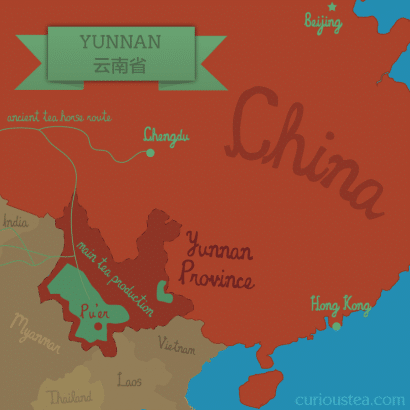
Purple Needle in this case refers to the leaves of this tea (needle-shaped) as well as the fact that this tea is made from purple leaf tea varietal plants, or ‘Zi Cha’. Purple leaf varietal tea plants are spread across Yunnan, accounting for 1-2% of all tea trees there, and are found at high altitude. These tea plants have purple coloured tea buds and young tea leaves, which are the result of unfavourable growing conditions and act as a natural way of protecting the tender leaves from harsh ultraviolet rays. This purple leaf varietal is highly prised in Yunnan and is used mostly for pu-erh production with some limited black tea production as well.
This tea was plucked in Autumn 2015. It has benefited from 1 year of storage to mellow and balance out the flavours and will be at it’s optimum drinking condition for at least one more year.
This Dian Hong Jing Mai Purple Needle has black long needle-shaped leaves with golden buds visible on many of the needles. The appearance of the needles is very delicate, wiry and thin. The amber liquor is very smooth and balanced. It is a little malty, with a fruity and sweet character. Pleasant notes of sugared plums and sweet citrus complete the taste.
Dian Hong Jing Mai Purple Needle black tea is best brewed at 90°C for 3-4 minutes according to your taste. It should also be brewed 3+ times, slowly increasing the steeping time with each subsequent brew.
You can buy Dian Hong Jing Mai Purple Needle black tea in our online shop.
We really hope that you enjoy the tea club selection for January and are looking forward to what we have in store for your February selection!
If reading this has piqued your interest, but you don’t yet subscribe to our monthly tea selections and would like to receive them in the future, you can set up your tea subscription in just a few clicks. We ship worldwide from London, UK.
We always love to hear from you, so if you have any questions, suggestions or just want to chat about tea, email us at contact@curioustea.com, via our Facebook page or via Twitter.
You can also follow us on Instagram for pretty tea photos.
Happy tea tasting!

